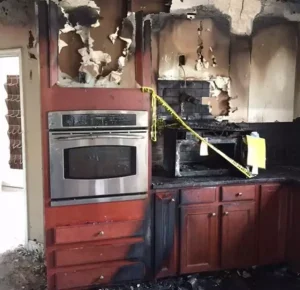Updated on March 13, 2023
Can Leaving the Stove on Cause a Fire
In this brief essay, we will offer an answers to those questions “can leaving the stove on cause a fire?” as well as the instructions for safe usage of the gas stove. You’re right. If you leave a gas stove on, the risk of a fire increases. The most prevalent cause of a kitchen fire is an unsupervised gas burner.
In the event that you arrive at your home and discover that your gas stove has been accidentally left on, follow these guidelines.

- Turn off the mains electricity to all electrical appliances (i.e. lights, etc.)
- Even a light switch should not be used to turn on or off any gas-powered gear (e.g. a gas fireplace).
- Reduce heat loss by keeping windows closed or opened as little as possible.
- It’s best to avoid starting your automobile in the garage or driveway if at all possible.
- Prepare to escape immediately with your family and pets (if you have them).
- After the emergency personnel come, they will inspect your house and gas line.
Are there any scenarios in which someone might die as a result of failing to turn off a gas stove?
- For a variety of reasons, it’s unsafe to leave a gas stove on for an extended period.
- Suffocation may occur as a consequence of the buildup of carbon monoxide.
- There is a risk of a fire erupting if anything (such as an oven mitt) comes into touch with the cooktop flames.
- Because gas leaks may occur regardless of whether or not the stove is switched on or off, installing a carbon monoxide detector is the most effective preventive measure.
- The majority of chefs would keep a gas burner on and for hours at a time, simply turning it off to checking on a pot of stew or tomatoes sauce every so often. Providing the area is sufficiently ventilated, it’s OK.
- Monoxide detectors should sound an alert if there is an issue with the carbon monoxide present in your home’s ventilation system.
Guidelines for Safe Use of Gas Cooking Appliances
- For gas range owners, the following tips will help ensure the best possible degree of safety.
- Gas appliances should be examined on a yearly basis at the very least. There are various plumbers that can handle this issue.
- Replace the existing carbon monoxide detectors with new ones that are similar to the old.
- When cooking on a gas stove, use the exhaust vent.
- Use pots and pans big enough to cover the burners completely. A pot or skillet’s sides should never be allowed to catch fire when cooking.
- A smoke alarm that has been placed correctly should be close.
- Safety knobs on gas stoves are recommended for the protection of small children and older individuals with dementia or Alzheimer’s disease.
- After each usage, wipe the top of the stove with a clean towel after the burners have cooled (small food particles can catch on fire).
- To keep them clean, soak the stove burner and grates in warm, soapy water once a week at the minimum. If the burner’s apertures are clogged with dirt, use a toothpick to remove it.
- It’s best to keep the pot covered and switch off the heat if there’s a little amount of smoke. It’s best to use a fire extinguisher or moist towel to dampen down the flames, but you may also use salt or baking soda in larger quantities if the fire is much more severe.
- It’s best to leave the home as soon as you detect gas odors, even if you didn’t use the stove. Exit the premises and call the local gas company to report the situation.
- Before utilizing any natural gas equipment, make sure you read the safety instructions that come with it.
- To get a manual if you don’t have access to one, you may contact the company or do an online search.

